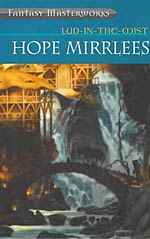
![]() verkisto
verkisto
7/26/2016
![]()
With Lud-in-the-Mist, I come to the end of reading a short list of classics that came recommended to me through Neil Gaiman. I mean, he didn't recommend them personally; I put this list together based on some blog posts and author's notes and forewords from other Gaiman works. This is also the third book in a row I've read that was originally published in the 1920s or before, which is a feat in and of itself. I figured since I had finished my English degree 20 years ago, I wouldn't put myself through that again.
Of those three books (The Man Who Was Thursday and The King of Elfland's Daughter being the other two), this was the most readable, and felt like it had the most modern narrative. There were still some word choices that stood out as being a little dated (one person's comment was "ejaculated," of all things), but otherwise it read like a standard modern novel, with a sly, subtle sense of humor running just beneath the events of the novel. It also had the most modern layout, though there were still some suggestions that the text was scanned in and read via OCR, since there were a handful of obvious grammar typos, and a lot of "ern"s that got printed as "em"s. But it didn't look or feel like a print-on-demand book.
The story is about a small town named Lud-in-the-Mist, which lives close to the end of the land of Fairy. The town has outlawed anything Fairy, though there is still a small black market for fairy fruit, and it's around that market that the story is told. The main character, Nathaniel Chanticleer, is forced to come to terms with his own feelings regarding the land of Fairy when his son becomes obsessed with it after being tricked into eating fairy fruit. He has to confront his own fears, doubts, and insecurities, and figure out a way to save his son.
The book is fun to read and has a nice balance of plot and theme, and I can see how much this book inspired Gaiman's own writings. He apparently based Stardust on this novel, and through the narrative, conclusion, and theme, I can see the similarities (the stories are otherwise really nothing alike). I think I still prefer Gaiman's style of storytelling over Mirrlees', but I can appreciate this story and the effect it had on modern fantasy overall. It's well worth reading for any fan of Neil Gaiman or fantasy overall.